Nature and Purpose of Business Chapter Notes | Business Studies (BST) Class 11 - Commerce PDF Download
Introduction
- As human beings, we all have different needs and wants—like food, clothes, phones, education, transport, and more. To meet these needs, we buy goods and services from shops, markets, or online platforms.
- But have you ever wondered how these products reach us?
- Before anything reaches the market, there’s a whole process behind it. People are involved in making the product (production), preparing it for sale (manufacturing), moving it to different places (distribution), and finally selling it (exchange). All of these are economic activities—and one of the most important among them is business.
What is Business?
A business is an economic activity where people produce and sell goods or services to meet the needs of others. The main aim is to earn a profit, but business also plays a big role in helping society by:
Creating useful products
Providing jobs
Supporting economic growth
While other institutions like schools, hospitals, political parties, or religious organizations also impact our lives, it is business that keeps the flow of goods and services going in our daily lives.

Business Covers Many Activities
Business is not just about selling things in a shop. It includes:
Production – making goods
Trade – buying and selling
Commerce – activities that support trade, like transport, banking, and advertising
In simple terms, business starts with production and ends when the product is used or consumed by someone.
Role of Business in the Development of Economy
- Trade and commerce have always been important for the economy. India had a prosperous trading past in ancient times.
- Both land and water routes were used for trading.
- Silk route and maritime trade were prominent.
- Trading activities generated surplus income.
- People engaged in various economic activities like agriculture and handicrafts.
- Family-based workshops were important for manufacturing.
- Indigenous banking system developed to finance trading activities.
- Hundi and Chitties were used for money transfer.
- Intangible form of exchange of money was created to reduce the risk of theft and robbery during long-distance travel.
- Credit transactions and availability of loans enhanced commercial operations.
- Indian subcontinent enjoyed a favorable balance of trade.
- Commercial and industrial banks evolved to finance trade and commerce.
- Major trade centers in ancient times included Patliputra, Peshawar, Taxila, and more.
- Major export items were spices, wheat, sugar, indigo, opium, and more.
- Major imports included horses, Chinese silks, linen, wine, and more.
- Business activities in India led to the growth of aids to trade such as transportation, banking, finance, and communication.

- India had the largest economy in the ancient and medieval world between the 1st and 7th centuries CE.
- British Empire's presence changed the Indian economy from being an exporter of processed goods to an exporter of raw materials.
- After independence, India aimed for a self-reliant socialistic society and focused on central economic planning.
- India faced challenges such as lack of capital, weak financial system, inadequate infrastructure, and more.
- Economic liberalization was adopted in 1991 to address these issues.
- Today, the Indian economy is one of the fastest-growing economies in the world.
- Factors such as rising incomes, savings, investment opportunities, and a younger population contribute to sustained growth.
- Government initiatives like "Make in India" and "Digital India" are expected to further boost the economy's trade balance.
Concept of Business
All Human beings where ever they may be require different type of goods and services to satisfy their needs. Business is a major economic activity in all modern societies concerned with production and sale of goods and services required by the people. It is aimed at earning money by satisfying human demands.
Meaning: Literal meaning of Business is “BUSY”. Business is defined as an economic activity involved in the production and sales of goods and services undertaken with the motive of earning profit by satisfying human needs in the society.
Characteristics of Business Activities

- Economic activity: It means an activity aimed at earning money. Business is also aimed at earning money or livelihood by satisfying human needs.
- Production and procurement of goods and services: Every business enterprise must either manufacture the goods or it acquires from producers. Goods may be consumer goods or Capital goods. Services means facility offered to consumers like banking, insurance etc.
- Sale or exchange of goods and services: Business involves transfer or exchange of goods and service for value.
- Dealing in goods and services on a regular basis: It should be a regular activity. One time sale or exchange will not be considered as business.
- Profit earning: Business always aims at earning profit.
- Uncertainty of earning: There is always a possibility of less amount of profit or even loss in business.
- Element of Risk: There is always a possibility of Uncertainty of earnings.
Comparison of Business, Profession and Employment
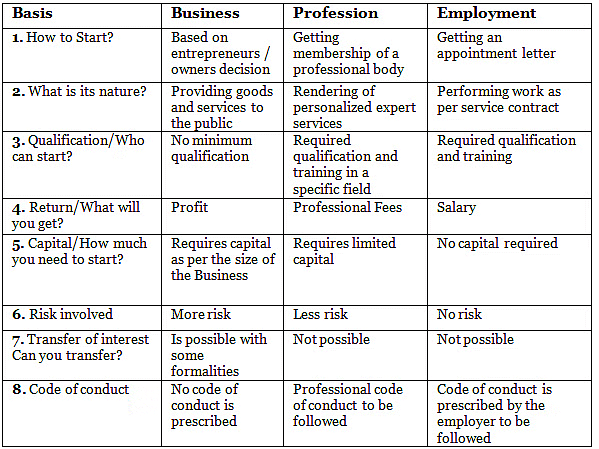
Classification of Business Activities
1. Industry
Production or processing of goods and services. It is concerned with changing the form of the products. It gives form utility to the products. It is classified into the following:
(a) Primary
Extraction and production of natural resources and reproduction and development of living organisms, plants etc.
(i) Extractive industry: Mining, lumbering, hunting and fishing operations.
(ii) Genetic industry: Breeding plants and animals. Poultry farming and fish hatchery.
(b) Secondary
(i) Manufacturing industry: Production and processing of goods creating form utilities.
Analytical industry: Separate different elements from the same materials. Example: Petroleum, Diesel.etc.
Synthetical Industry: Combines various ingredients.Example: Cement, Textiles, etc.
Processing industry: Involves series of activities.Example: Sugar and Paper.
Assembling Industry: Assembles different components.Example: Television, Car, Computer.
(ii) Construction Industry: Construction of Buildings, dams, bridges, etc.
(c) Tertiary
Support services to primary and secondary industries.
2. Commerce
It includes all those activities which are concerned with removing all the hindrances in the movement of goods from the manufacturer to the consumers. It includes the following activities.
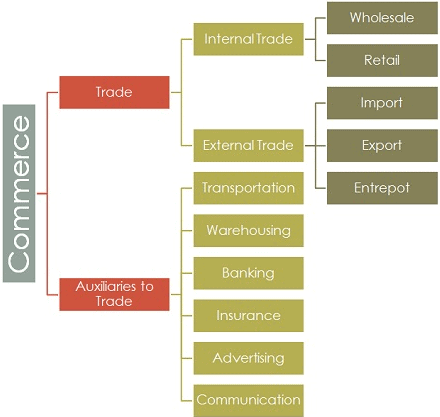
Commerce includes the following activities:
- Industry
- Trade – Export, Import
- Transport and communication
- Banking
- Insurance
- Advertisement
- Packaging
- Warehousing etc.
Trade and Auxiliaries to Trade
Trade means exchange of goods and services between sellers and buyers with profit motive.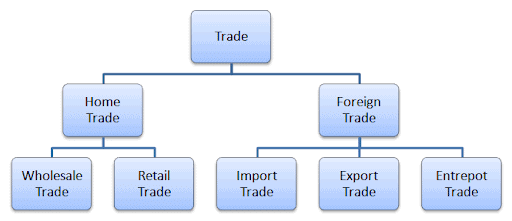
Auxiliaries to Trade
- Transport and communication: Physical movement of goods from the place where there is no demand to the place where there is demand. It creates place utility to the product.
- Banking and Finance: Helps in removing financial hindrances. Facilitates production, buying and selling by providing funds by way of loans.
- Insurance: It facilitates business by ensuring compensation for various types of risks.
- Warehousing: It keeps the goods in tact till they are in demand. It creates time utility to the product.
- Advertising: It provides information about availability of goods and services. It induces the consumers to buy the product.
Objectives of Business
An objective is the starting of business. Every business is directed towards the achievement of certain business objectives. Objectives are needed in every area that influences survival and prosperity of business.
Primary objective of every business is to earn profit but there are several other areas where objectives are needed.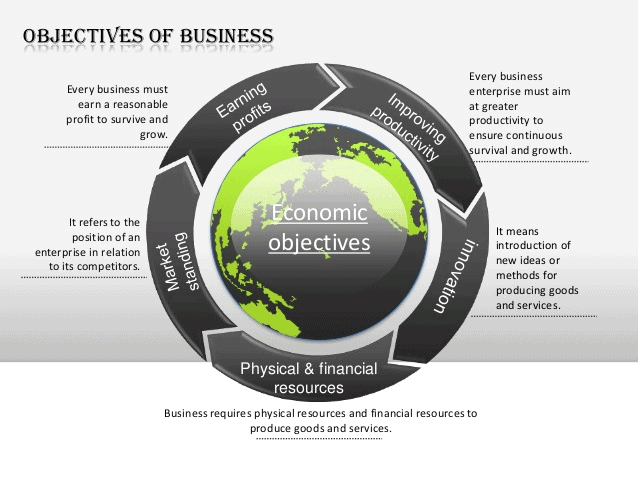
Market Standing
- Market standing is crucial for business success and growth.
- It involves building a positive reputation and strong goodwill.
- Market standing helps establish a unique identity in the market.
- It is important to offer competitive products at reasonable prices.
- Customer satisfaction is a key aspect of market standing.
- A business should aim to have a stronger position compared to its competitors.
Innovation
- Innovation involves introducing new ideas or methods in the way something is done or made.
- It can include developing new products or modifying existing ones to improve their operation.
- There are two types of innovation: innovation in products/services and innovation in skills and activities needed to supply them.
- Innovation is essential for businesses to thrive in a competitive world.
Productivity
- Productivity is determined by comparing the value of output to input value.
- It serves as a gauge of efficiency.
- Enterprises need to strive for increased productivity to ensure their ongoing survival and advancement.
- This can be achieved by optimizing the use of available resources.
Physical and Financial Resourses
- Businesses need physical resources such as plants, machines, and offices to produce goods and services.
- They also require financial resources, i.e., funds, to be able to acquire the necessary physical resources and operate efficiently.
- Acquiring and efficiently using these resources is crucial for businesses to produce and supply goods/services to customers.
Earning Profits
- Profitability defined as profit in relation to capital investment
- Reasonable profit is crucial for survival and growth
- An important objective for every business
Social Responsibility
- Business firms have an obligation to contribute resources towards solving social problems.
- They should operate in a socially desirable manner.
Business Risk
- Business risk refers to the possibility of inadequate profits or losses due to uncertainties or unexpected events.
- Factors such as changes in consumer preferences or increased competition can lead to lower demand and profits.
- Shortages of raw materials can increase production costs and reduce profits.
- There are two types of business risk: speculative and pure. Speculative risks involve the possibility of both gain and loss, while pure risks only involve the possibility of loss. Examples of pure risks include fire, theft, and strikes.
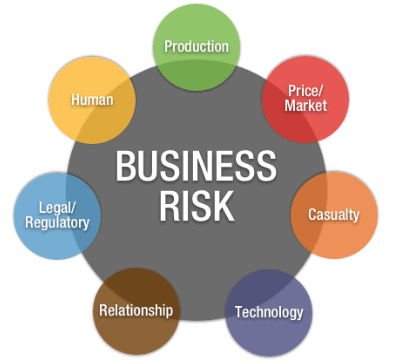
Nature Of Business Risks
- Risk is inherent in every business and cannot be completely eliminated.
- Business risks arise due to uncertainties and lack of knowledge about future events.
- The degree of risk in a business depends on its nature and size.
- Certain factors like natural calamities, changes in demand and prices, government policies, and technological advancements contribute to business risks.
- Profit serves as the reward for taking risks in business. The greater the risk, the higher the profit potential.
Causes of Business Risks
- Natural Causes: Risk may be due to flood, earth quake, lightning, heavy rains etc.
- Human Causes: It includes dishonesty, carelessness or negligence of employees, strikes, riots, etc.
- Economic Causes: It includes uncertainties relating to demand for goods, competition, price, collection of dues from customers, changes in economic policies etc.
- Other Causes: It includes political disturbances, mechanical failures etc.
Starting a Business- Basic factors
Starting a business enterprise involves employing resources to achieve objectives. The process of setting up a business is called entrepreneurship. The person who sets up the business is called an entrepreneur. Entrepreneurship provides self-employment opportunities and contributes to the creation of employment and professional opportunities. Entrepreneurship involves identifying a need, mobilizing resources, and organizing production to deliver value to customers, returns for investors, and profits for oneself.

Factors affecting business:
- Selection of Line of Business: Based on the requirements in the market nature and type of business to be selected.
- Size of the Firm: Based on the amount of funds available and demand for the product in the market size of the firm i.e small scale or medium or large scale to be decided.
- Choice of form of ownership: Based on the amount of capital required, legal formalities to be filled in, liability of the owner, etc. the form of ownership is to be decided.
- Location of the Business enterprise: Based on the availability of raw material and infrastructure facilities location of the Business is to be selected.
- Financing the Proposition: Requirement of Capital and its sources must be decided.
- Physical facilities: Availability of physical facilities including machines and equipment, building and supportive services to be considered before starting a business.
- Plant layout: Plant layout should draw to show the arrangement of these facilities.
- Competent and committed worked force: Every business needs work force. So careful planning should be about selection, training and motivation of employees.
- Tax Planning: Tax liability and its impact on business to be considered.
- Launching the enterprise: After fulfilling the formalities entrepreneur can launch the business.
HOTs
Q.1. Harish produces wheat for personal consumption. Will it be a business activity?
Ans. No, as it is not performed for earning profit.
Q.2. A person sells his old car at a profit. Can it be termed as a business activity? Explain.
Ans. No, because business involves dealing in goods on regular basis. Brief Explanation of features of business is given in this document above.
Q.3. Risk is an inherent element of a Business. Do you agree? Explain.
Ans. Meaning and Nature of Business Risks detailed answer is given in this document above.
Role of Profit in Business:
1. It is source of income for the business man.
2. It provides funds for expansion.
3. It is an indicator of efficiency of business man.
4. It builds up reputation.
|
38 videos|180 docs|28 tests
|
FAQs on Nature and Purpose of Business Chapter Notes - Business Studies (BST) Class 11 - Commerce
| 1. What is the concept of business? |  |
| 2. How is business different from a profession and employment? |  |
| 3. What are the objectives of business? |  |
| 4. What are the different classifications of business activities? |  |
| 5. What are the basic factors to consider when starting a business? |  |






















